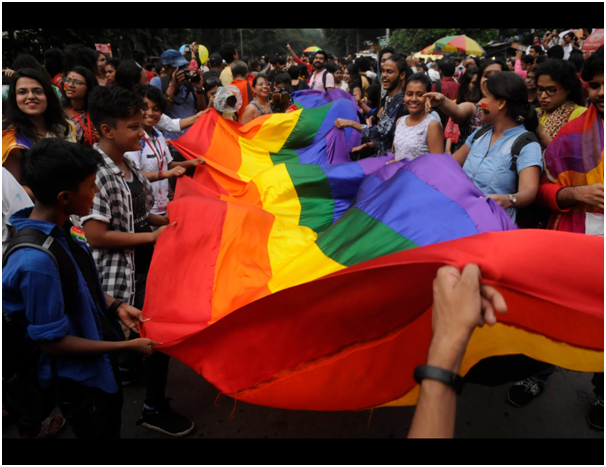What is India’s stand on same-sex marriage?
Context: Recently a Bench led by Chief Justice of India D.Y. Chandrachud referred petitions to legally recognise same-sex marriages to a Constitution Bench of five judges of the Supreme Court. The Court has listed the case for final arguments on April 18.
What is the case?
- The Court has been hearing multiple petitioners’ requests for legal recognition of same-sex marriages under a special law.
- In the beginning, it took up the case of two partners who said the non-recognition of same-sex marriage amounted to discrimination that strikes at the root of “dignity and self-fulfilment” of LGBTQIA+ couples.
- The petitioners cited the Special Marriage Act, 1954, which provides a civil marriage for couples who cannot marry under their personal law, and appealed to the Court to extend the right to the LGBTQIA+ community, by making the “marriage between any two persons” gender neutral.
Why does the LGBTQIA+ community want this right?
- Even if LGBTQIA+ couples may live together, legally, they are on a slippery slope. They do not enjoy the rights married couples do.
- For example, LGBTQIA+ couples cannot adopt children or have a child by surrogacy; they do not have automatic rights to inheritance, maintenance and tax benefits; after a partner passes away, they cannot avail of benefits like pension or compensation.
- Since marriage is a social institution, “that is created by and highly regulated by law,” without this social sanction, same-sex couples struggle to make a life together.
Which way are the Courts leaning?
- The Courts, leaning on Article 21 that guarantees the right to life and liberty, have time and again ruled in favour of inter-faith and inter-caste marriages, directing the police and other rights organisations to give them protection when they were threatened by parents or society, pointing out that “all adults have the right to marry a person of their choice.”
- In Navtej Singh Johar (2018), when homosexuality was decriminalised, the Court said, “Members of the LGBT[QIA+] community are entitled to the benefit of an equal citizenship, without discrimination, and to the equal protection of law”;
- The choice of whom to partner, the ability to find fulfilment in sexual intimacies and the right not to be subjected to discriminatory behaviour are intrinsic to the constitutional protection of sexual orientation.
- Last November, the Court transferred same-sex cases pending before several High Courts to itself.
What is the Centre’s stand?
- At depositions in courts and outside, the Centre has opposed same-sex marriage, and said judicial interference will cause “complete havoc with the delicate balance of personal laws”.
- While filing a counter-affidavit during this hearing, the government said that decriminalisation of Section 377 IPC does not give rise to a claim to seek recognition for same-sex marriage.
- After the S. Puttaswamy verdict (2017) which upheld the right to privacy and Navtej Singh Johar (2018) that decriminalised homosexuality, there was hope that same-sex marriages would be legalised, but that has not been the case, prompting many couples to move court.
- In its affidavit filed in the Supreme Court, the government said that the “notion of marriage itself necessarily and inevitably presupposes a union between two persons of the opposite sex.
- This definition is socially, culturally and legally ingrained into the very idea and concept of marriage and ought not to be disturbed or diluted by judicial interpretation.”
- It submitted that despite the decriminalisation of Section 377 of the Indian Penal Code, the petitioners cannot seek same-sex marriage to be treated as a fundamental right and be recognised under the laws of the country.
- Parliament has designed and framed the marriage laws in the country, which are governed by the personal laws/codified laws relatable to customs of various religious communities, to recognise only the union of a man and a woman to be capable of legal sanction, and thereby claim legal and statutory rights and consequences” and that “any interference with the same would cause a complete havoc with the delicate balance of personal laws in the country and in accepted societal values.
- The government said that even if such a right (allowing same-sex marriage) is claimed under Article 21, the “right can be curtailed by competent legislature on permissible constitutional grounds including legitimate state interest.”
- The government submitted that statutory recognition of marriage as a union between a ‘man’ and a ‘woman’ is inextricably tied to acceptance of the heterogeneous institution of marriage and acceptance of Indian society based on its own cultural and sociological norms acknowledged by the competent legislature.
Are the executive and the judiciary on opposing sides on this?
- With the government saying that the concept of marriage “ought not to be disturbed or diluted by judicial interpretation,” and the Court leaning towards granting equal rights, including marriage of same-sex couples, citing the Constitution and changing norms, it is clear that the two organs of the state are not in agreement on this. Even if the Court rules in its favour, the march towards equality for the LGBTQIA+ community will be hard.
- Enforcing something like same-sex marriage in a diverse country with well-entrenched traditions will not be easy. Rights activists are calling for awareness on sex, gender and constitutional rights from the school level to change things on the ground.
| Practice Question
1. What will be the implication of allowance to Same sex marriages? Do you think it can hinder the ethos of Indian society? |




